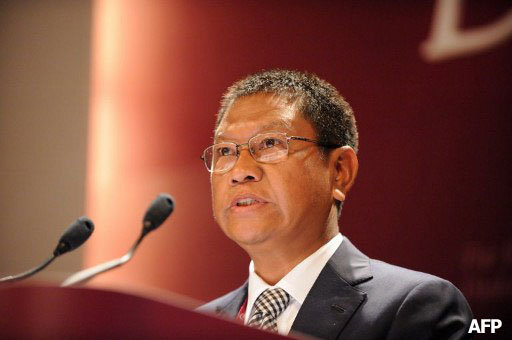Burma has abandoned its primitive nuclear program and has reduced its ties with North Korea, the Burmese defence minister said on Saturday.
 “We have already said very clearly it was not for defense, it was not for weapons, it was just research in the past,” Defense Minister Lieutenant General Hla Min said at the Shangri-La Dialogue, an annual security forum in Singapore attended by senior regional civilian and military leaders, according to wire reports.
“We have already said very clearly it was not for defense, it was not for weapons, it was just research in the past,” Defense Minister Lieutenant General Hla Min said at the Shangri-La Dialogue, an annual security forum in Singapore attended by senior regional civilian and military leaders, according to wire reports.
In 2010, news reports based on interviews with a Burmese army major who had defected said he brought out papers, which were said to have documented the project.
At the defence conference, delegates said the comments were remarkably frank and were a sign of how far the once-secretive nation has moved in its step-by-step march toward becoming a more democratic country following elections last year. The reforms have attracted the interest of foreign investors and persuaded Western countries to remove sanctions.
The minister said Burma has maintained political and military ties with Pyongyang but “because of our opening [to democracy] and our new efforts, we have stopped such relationships with North Korea.”
A U.N. panel of experts that monitors compliance with sanctions on North Korea is investigating reports of possible weapons-related deals between Pyongyang and Syria and Myanmar, the panel said in a confidential report seen by Reuters news agency.
“According to our foreign policy, we have friendly relations with all countries so it is just a regular relationship,” the minister said of current dealings with North Korea.
“In reality we were just beginning on doing academic studies,” he said. “But in this new government, we have already given up all activities on nuclear issues. And we have no further plans to extend on this.”
Hla Min said the nuclear program never got very far due to “our constraints,” adding “there were no practical ways” to advance it.
He said there was little point in having the International Atomic Energy Agency visit the country. “We have nothing to check and nothing to see so it is irrelevant,” he said.
Discussing the Burmese military allocation of 25 per cent of seats in its parliament under a new constitution it helped to draft, Hla Min said that apsect of the constitution could be altered as Burma develops.
“If you have a fish in fresh water, you cannot put the fish in salt water so we need to take time for transformation and progress,” he said. “When the time is appropriate, there would be changes and this 25 per cent participation could be reduced.”


